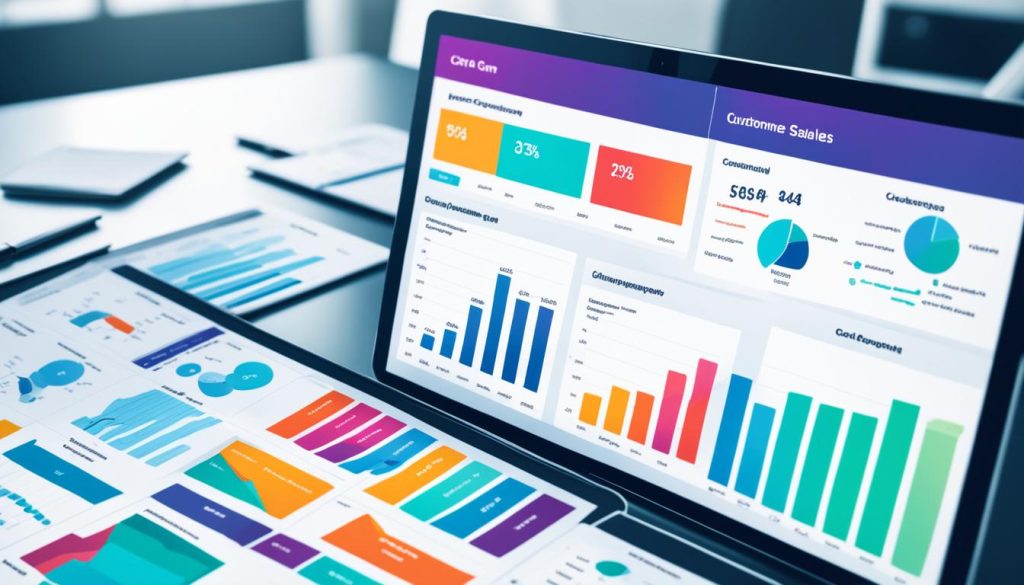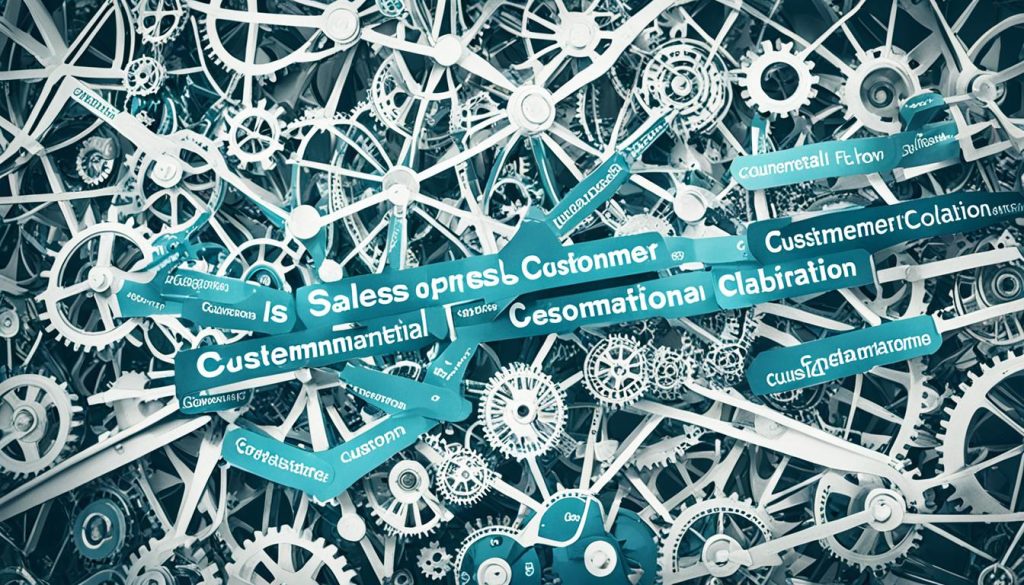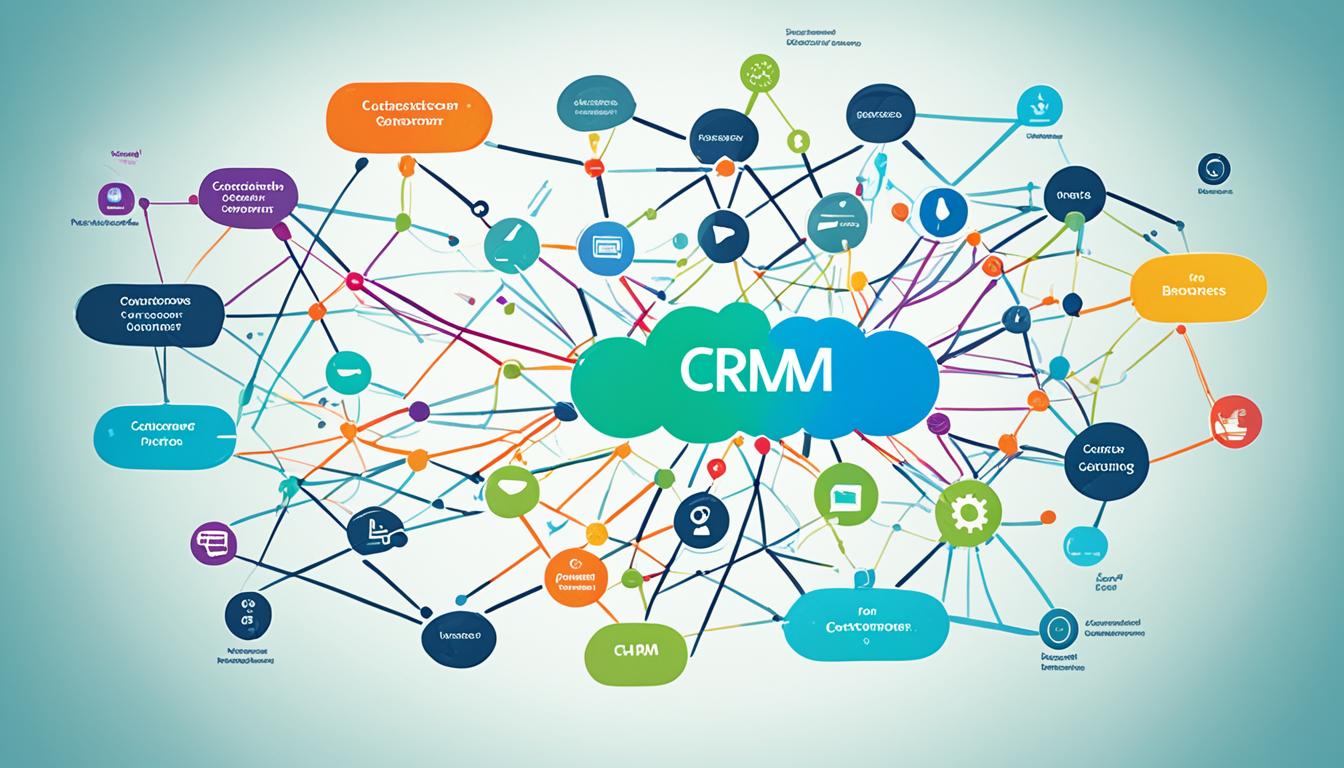A CRM (Customer Relationship Management) system is a powerful tool for businesses looking to enhance their business development efforts. It serves as a central hub for managing customer relationships, identifying new prospects, and driving growth opportunities. With the right CRM software in place, businesses can streamline their sales processes, improve collaboration among teams, and gain valuable insights to boost their overall business performance.
Whether you’re a small startup or a well-established enterprise, finding the best CRM for your business development needs is essential. In this article, we’ll explore the key factors to consider when choosing a CRM, understand how CRM integration can benefit business development efforts, and highlight the important role of Business Development Managers in CRM usage.
Key Takeaways:
- Choosing the right CRM is crucial for effective business development.
- A CRM system helps manage customer relationships, identify new opportunities, and streamline sales processes.
- Key features to consider when selecting a CRM include analytics, reporting, lead management, and mobile accessibility.
- Business Development Managers play a crucial role in CRM usage and data entry.
- The benefits of using a CRM for business development include improved communication, lead nurturing, and collaboration.
Understanding Business Development and CRM Integration
Business development plays a crucial role in creating value, expanding customer base, entering new markets, and improving products or services. In today’s digital age, businesses are harnessing the power of CRM systems for effective business development. These systems help manage interactions with clients and prospects, resulting in enhanced customer relationship management (CRM) for business growth.
CRM software is designed to compile and organize customer data, empowering businesses to execute targeted marketing campaigns and provide personalized experiences. With CRM, teams can collaborate seamlessly, ensuring smooth coordination across departments and maximizing business development opportunities.
Using a CRM for business development offers numerous benefits. It provides a central repository for customer information, allowing businesses to track communication history, manage leads efficiently, and forecast sales accurately. Furthermore, CRM software facilitates collaboration and ensures valuable insights are accessible to all members of the team, fostering a customer-centric approach to business growth.
By integrating CRM into their business development strategies, companies can streamline their processes, improve customer satisfaction and retention, and drive overall success.
Let’s take a closer look at how CRM systems are transforming the landscape of business development:
CRM and Business Development: A Synergistic Relationship
“The integration of CRM systems into business development practices has revolutionized how companies manage customer relationships and drive growth.” – John Smith, Business Development Expert
Business development is a dynamic process that involves identifying new opportunities, building strategic partnerships, and nurturing customer relationships. By leveraging CRM software, businesses can gain actionable insights into customer behavior, preferences, and needs. This knowledge empowers companies to develop personalized marketing strategies and create compelling offers that resonate with their target audience.
Efficiently Managing Interactions with Clients and Prospects
CRM systems serve as a one-stop solution for managing customer interactions throughout the business development journey. The extensive functionalities of CRM platforms allow businesses to track communication history, automate lead nurturing processes, and monitor the progress of deals and opportunities. This holistic approach to CRM enables teams to provide personalized attention to clients, resulting in improved customer satisfaction and increased sales.
Enhancing Collaboration and Teamwork
Successful business development requires effective collaboration among team members. CRM software facilitates seamless information sharing, ensuring that everyone involved in the process has access to comprehensive customer data, communication records, and deal status updates. This enhanced collaboration enables teams to align their efforts, share insights, and work together towards achieving common goals.
In the next section, we will explore the key features to look for in a CRM for business development, enabling companies to make an informed choice and unleash the full potential of CRM systems for their growth strategies.
Key Features to Look for in a CRM for Business Development
In today’s competitive business landscape, choosing the right CRM software is crucial for effective business development. A CRM system not only helps manage customer relationships but also provides valuable insights and tools to drive growth. When selecting a CRM for business development, it is essential to consider the following key features:
1. CRM Analytics for Data-Driven Insights
CRM analytics is a powerful feature that allows businesses to leverage data for informed decision-making. Look for a CRM that offers robust analytics capabilities, enabling you to track customer interactions, measure campaign effectiveness, and identify trends and patterns that can guide your business development strategy.
2. Comprehensive Reporting for Measuring Effectiveness
Effective business development requires accurate measurement and reporting of key metrics. Look for a CRM that provides comprehensive reporting capabilities, allowing you to assess the performance of your sales and marketing efforts, customer engagement, and overall business growth.
3. Integration Capabilities with Existing Software
In a business environment where multiple software tools are used, seamless integration is essential for efficient workflows. Choose a CRM that offers integration capabilities with your existing software stack, such as project management tools, email platforms, and lead management systems.
4. Mobile Accessibility for On-the-Go Access
Business development professionals often work outside the office, meeting clients, attending events, and traveling. Ensure that the CRM you choose has a mobile app or a responsive design, allowing you to access critical customer information and manage tasks on the go.
5. Data Security and Compliance
Protecting customer data and ensuring compliance with regulations is paramount. Look for a CRM that prioritizes data security, offers encryption features, and aligns with industry compliance standards like GDPR or CCPA.
6. Customization and Flexibility for Unique Needs
Every business has specific requirements and processes. Choose a CRM that allows for customization and flexibility to adapt to your unique business needs. Look for features like custom fields, workflows, and automation that can be tailored to your business development strategies.
7. User Support and Training
A user-friendly CRM with comprehensive support and training resources can greatly facilitate adoption and maximize its benefits. Ensure that the CRM vendor offers user support options, including documentation, tutorials, and responsive customer service, to help your team get up to speed quickly.
8. User Reviews and Recommendations
Researching user reviews and seeking recommendations from other business development professionals can provide valuable insights into a CRM’s strengths and weaknesses. Take the time to explore reviews and ratings from reliable sources to gather a holistic perspective before making your decision.
9. Vendor Reputation
Choosing a reputable CRM vendor ensures reliability, regular updates, and ongoing support. Consider the vendor’s track record, years of experience, and customer testimonials to gauge their reputation in the market.
10. Free Trials and Demos
Take advantage of free trials and demos offered by CRM vendors to evaluate the software firsthand. Testing the CRM’s features, usability, and compatibility with your business processes will help you make an informed decision.
11. Long-Term Viability
Choosing a CRM is an investment in the long-term success of your business. Assess the vendor’s financial stability, product roadmap, and commitment to innovation to ensure that the CRM you choose will continue to evolve and meet your evolving business development needs.
By considering these key features when selecting a CRM for business development, you can find a solution that aligns with your goals, enhances your team’s productivity, and drives sustainable growth.

The Role of Business Development Managers and CRM Usage
Business Development Managers (BDRs) play a crucial role in driving growth and expanding business opportunities. As heavy users of CRM systems, BDRs leverage these tools to effectively manage leads and develop them into valuable opportunities.
One of the key responsibilities of BDRs is data entry in the CRM. By diligently entering accurate and up-to-date data, they ensure the integrity of the CRM system and enable efficient customer management. This includes recording interactions, tracking progress, and maintaining a comprehensive view of every customer’s journey.
However, in order to fully harness the power of CRM for business development, it is essential for BDRs to undergo comprehensive training on CRM usage. This training equips them with a deep understanding of the CRM’s features and functionalities, empowering them to maximize its benefits and streamline their workflows.
During CRM training, BDRs learn how to effectively track customer interactions, log important details, and analyze data for valuable insights. They also develop the skills to create personalized campaigns, automate lead nurturing processes, and collaborate effectively with other team members.
By embracing CRM usage, business development managers can elevate their performance, enhance team collaboration, and drive business growth. With accurate data entry, continuous training, and a deep understanding of CRM functionalities, BDRs become instrumental in leveraging CRM systems to their full potential.

Improving Efficiency with CRM Data Entry
Accurate CRM data entry is the foundation of effective customer management and business growth. Here are some best practices for seamless CRM data entry:
- Consistency is key: Establish standardized data entry guidelines to ensure consistency across the CRM system.
- Regular updates: Encourage BDRs to update customer information regularly, ensuring the CRM reflects the latest interactions and insights.
- Proper categorization: Train BDRs on how to appropriately categorize leads and opportunities within the CRM, allowing for targeted campaigns and efficient pipeline management.
“Accurate CRM data entry enables business development managers to leverage valuable customer insights, make informed decisions, and nurture leads effectively.”
By investing in comprehensive CRM training and emphasizing the importance of accurate data entry, businesses can empower their business development managers to drive growth, optimize customer relationships, and achieve sustainable success.
| Benefits of CRM Usage for Business Development Managers | Value |
|---|---|
| Effective Lead Management | Efficiently track and manage leads for improved conversion rates |
| Data-Driven Insights | Access valuable customer data and analytics for informed decision-making |
| Streamlined Collaboration | Facilitate seamless communication and collaboration among team members |
| Personalized Customer Engagement | Create targeted marketing campaigns and tailored communications |
| Enhanced Sales Efficiency | Automate workflows, reduce manual tasks, and streamline the sales process |
Benefits of Using a CRM for Business Development
A CRM (Customer Relationship Management) system offers numerous advantages for businesses seeking to enhance their development strategies and drive growth. By effectively utilizing a CRM, businesses can unlock a range of benefits that optimize communication, streamline processes, and improve overall customer satisfaction and retention.
Improved Communication Tracking
One of the key benefits of using a CRM is improved communication tracking. With a CRM system, businesses can easily record and access all customer interactions, ensuring that nothing falls through the cracks. Whether it’s a phone call, email, or meeting, a CRM enables teams to stay organized and stay on top of customer conversations, facilitating more personalized and attentive customer service.
Automated Lead Nurturing
A CRM system also allows businesses to automate lead nurturing processes, saving time and effort while maintaining consistent and effective communication with prospects. By setting up automated workflows and triggers, businesses can deliver targeted messages and content to leads, helping to nurture and convert them into customers.
Accurate Sales Forecasting
Accurate sales forecasting is crucial for effective business development. A CRM system provides valuable insights and data that can be used to forecast sales accurately. By analyzing historical customer data, businesses can identify trends, patterns, and potential sales opportunities, enabling better forecasting accuracy and helping to align sales and marketing efforts.
Enhanced Collaboration
Collaboration is essential for successful business development, and a CRM system fosters enhanced collaboration among teams. With a centralized platform for storing and sharing customer information, everyone can access the same data, ensuring consistent messaging and coordinated efforts. This collaboration improves efficiency, streamlines processes, and eliminates silos, driving better results and growth.
Streamlined Sales, Marketing, and Customer Service Processes
A CRM system integrates the sales, marketing, and customer service functions, simplifying and streamlining processes across the customer journey. From lead generation and qualification to conversion and post-sales support, a CRM ensures seamless transitions and a holistic view of the customer, enabling businesses to deliver a unified and satisfying experience at every touchpoint.
Valuable Data-Driven Insights
By leveraging the data stored within a CRM system, businesses gain valuable insights into customer behavior, preferences, and trends. These insights enable businesses to make informed decisions, tailor marketing strategies, and optimize overall business development efforts. With data-driven insights, businesses can identify new opportunities, target the right audience, and deliver more personalized experiences.
Overall, the benefits of using a CRM for business development are numerous and impactful. From improved communication tracking and automated lead nurturing to accurate sales forecasting and enhanced collaboration, a CRM system empowers businesses to achieve their growth goals by optimizing processes, leveraging valuable data, and delivering exceptional customer experiences.

How to Choose the Right CRM for Your Business
When it comes to choosing a CRM for your business, there are several factors you need to consider. By carefully evaluating your specific needs and requirements, you can select a CRM that aligns with your goals and helps drive your business forward.
Determine Your Business Needs
The first step in choosing the right CRM is to assess your specific business needs. Consider what functionalities are essential for your organization and what features would benefit your team the most. Think about areas such as lead management, sales forecasting, customer service, and data analytics.
Define Your Budget
Next, define your budget for a CRM solution. It’s essential to have a clear understanding of how much you are willing to invest and what you can afford. Remember to consider any additional costs, such as customization, integration, maintenance, and ongoing support.
Evaluate Scalability and Ease of Use
Scalability is another crucial aspect to evaluate when selecting a CRM. Consider the future growth and expansion plans of your business and ensure that the CRM you choose can accommodate your evolving needs. Additionally, prioritize ease of use to ensure that your team can adopt the CRM quickly and efficiently.
Consider Integration Capabilities
An effective CRM should seamlessly integrate with your existing systems and processes. Evaluate the CRM’s integration capabilities with other software you use, such as marketing automation tools, email platforms, or project management software. This integration ensures a smooth workflow and eliminates duplications or inefficiencies.
Assess Mobile Accessibility
In today’s mobile-centric world, it’s essential to choose a CRM that provides mobile accessibility. This allows your sales team to access critical customer information on the go, update records, and collaborate with colleagues even when they are not in the office.
Prioritize Data Security and Compliance
Data security and compliance are crucial considerations when selecting a CRM. Ensure that the CRM provider adheres to industry-standard security protocols, data encryption practices, and confidentiality measures. Additionally, verify that the CRM is compliant with data protection regulations such as GDPR or CCPA, depending on your jurisdiction.
Customization and Flexibility
Every business has unique requirements, so choose a CRM that offers customization options. The ability to tailor the CRM to your specific business needs ensures that you can achieve maximum functionality and efficiency. Look for features like customizable fields, workflows, and reporting.
Consider User Support and Training
User support and training are vital elements for successful CRM implementation. Ensure that your chosen CRM provider offers comprehensive training resources, such as documentation, tutorials, and responsive customer support. This support ensures a smooth transition and assists your team in utilizing the CRM effectively.
Seek User Reviews and Recommendations
Before making a final decision, seek out user reviews and recommendations. This feedback from other businesses who have experience using the CRM can provide valuable insights into the software’s strengths, weaknesses, and overall user satisfaction.
Evaluate Vendor Reputation
Consider the reputation and credibility of the CRM vendor. Research the vendor’s track record, client testimonials, and industry recognition. A reputable vendor is more likely to provide quality software and reliable support.
Take Advantage of Free Trials and Demos
Finally, take advantage of free trials and demos offered by CRM providers. This hands-on experience allows you to test the software’s functionalities, user interface, and overall suitability for your business. Use this opportunity to involve key team members and gather their feedback before making the final decision.
By following these steps and considering these factors, you can confidently choose the right CRM for your business. Remember, the right CRM will help streamline your processes, enhance customer relationships, and drive your business growth.

| CRM Features | Description |
|---|---|
| CRM Analytics | Track and analyze customer data to gain valuable insights for informed decision-making. |
| Comprehensive Reporting | Create and generate detailed reports to measure the effectiveness of your business development strategies. |
| Integration Capabilities | Seamlessly integrate with other software systems to streamline workflows and eliminate data silos. |
| Mobile Accessibility | Access and manage customer data on the go through mobile devices for increased productivity. |
| Data Security and Compliance | Ensure the safety and confidentiality of customer information while complying with data protection regulations. |
| Customization and Flexibility | Modify and tailor the CRM to suit your unique business needs and requirements. |
| User Support and Training | Access comprehensive training resources and responsive customer support for a successful CRM implementation. |
Conclusion
Choosing the best CRM for business development is a critical decision that can significantly impact operations and business growth. A well-selected CRM can provide numerous benefits, including improved communication tracking, automated lead nurturing, accurate sales forecasting, enhanced collaboration, and valuable data-driven insights.
To choose the right CRM, businesses should first consider their specific needs and goals. It is crucial to evaluate the features and capabilities of CRM software, ensuring it aligns with the unique requirements of the business. Additionally, involving key team members in the decision-making process can ensure the CRM meets their needs and preferences.
By following a CRM selection guide, businesses can make an informed decision. They should take into account factors such as scalability, ease of use, integration capabilities, mobile accessibility, data security and compliance, customization options, user support and training, and vendor reputation. Taking advantage of free trials and demos can also provide an opportunity to test the CRM before making a final decision.
Ultimately, by choosing the right CRM, businesses can streamline their sales, marketing, and customer service processes and drive success in their business development efforts. The best CRM for business development is the one that aligns with the specific needs and goals of the business and empowers teams to deliver exceptional customer experiences.




No comments! Be the first commenter?